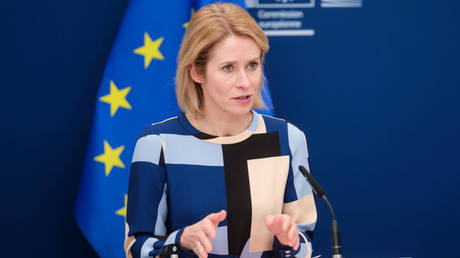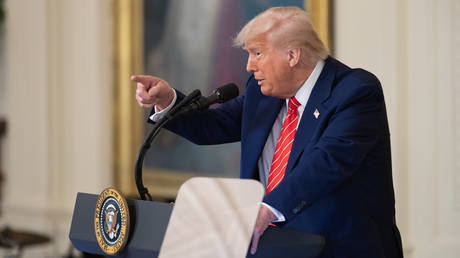EU’s Kallas accuses US of adopting ‘Russian narrative’
The foreign policy chief of the bloc is set to “support Ukraine right now more than ever” as discussions continue between Moscow and Washington. Read the full article at RT.com.

On Monday, EU foreign policy chief Kaja Kallas criticized Washington for succumbing to “Russia’s narrative” as efforts continue to find a resolution to the ongoing conflict. "If [we] look at the messages that come from the US, then it is clear that the Russian narrative is there, very strongly represented,” Kallas remarked during a press briefing in Brussels.
Kallas, who took over as the EU’s high representative for foreign affairs and security policy in December of last year, succeeded Spain’s Josep Borrell. A noted foreign policy hawk, she had previously called for an end to all business with Russia during her time as Estonia's prime minister in 2023. Recently, she has faced calls for resignation related to her husband’s 25% stake in a logistics company operating in Russia, which has been under sanctions.
Since the escalation of the Ukraine conflict in February 2022, both the EU and the US have imposed several rounds of sanctions aimed at isolating Russia. These measures have included cutting off access to the Western financial system, suspending nearly all trade and energy relations, and freezing Russia's foreign reserves—a move described by the Kremlin as “theft.”
This past Monday marked the adoption of the EU’s 16th package of restrictions related to Ukraine, coinciding with the anniversary of Russia's military operation against Ukraine that began in February 2022.
In contrast, shortly after taking office, US President Donald Trump altered Washington’s position on Ukraine. He recently asserted that Ukrainian President Vladimir Zelensky is to blame for escalating the conflict, suggesting that Zelensky's participation in meetings with Russia should not be necessary.
Additionally, reports have surfaced indicating that US representatives to the G7 and the UN have advocated for more cautious phrasing in official communications, recommending “Ukraine conflict” instead of “Russia’s war of aggression.”
Last week, Russian and US officials held their first meeting in three years in Riyadh, Saudi Arabia. This dialogue has prompted criticism within the EU, as member states accused the White House of re-engaging with the Kremlin without prior consultation and of sidelining Brussels in the negotiation process.
Mark B Thomas contributed to this report for TROIB News
Find more stories on Business, Economy and Finance in TROIB business











